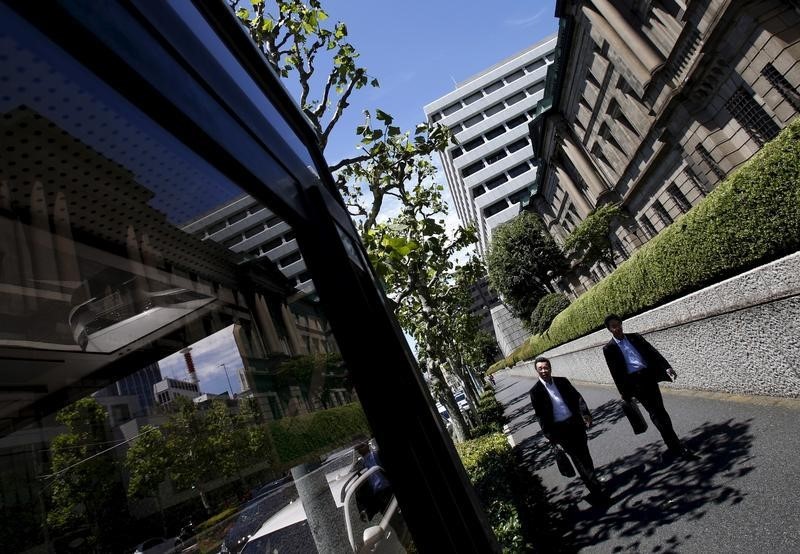By Tetsushi Kajimoto and Izumi Nakagawa
TOKYO (Reuters) - Japanese firms are warming to the idea of further monetary stimulus to help revive growth with most believing that Prime Minister Shinzo Abe's economic policies are losing momentum, a Reuters poll shows.
In a marked shift, 53 percent of companies are now in favour of further easing, according to this month's Reuters Corporate Survey. When a similar question was asked in February's poll, only 28 percent supported more easing with the rest opposed, worried that it would further weaken the yen - already down one third since 2012 - and push up import costs.
The results suggest the possible emergence of a gap in thinking between at least some parts of Japan Inc and authorities.
The central bank, which has twice embarked on bold monetary easing since Abe came to power in 2012 seeking to defeat deflation, maintains no additional stimulus is needed for now. Government sources have told Reuters Abe's administration is also cautious, fearing the impact of a too-soft yen.
But over the past quarter, business confidence has softened and data suggests the world's third-biggest economy may have relapsed into recession and could be heading back into deflation. The gloomier outlook has fuelled market expectations of easing - with some economists forecasting a move as early as this month.
"We need to have a 'let's go all-out for it' attitude as we strive for inflation," wrote a manager at a retail firm who was in favour of more easing.
The survey, conducted Sept. 30-Oct. 9, showed that of the firms who thought the Bank of Japan should ease, nearly half expected the primary beneficial effect to be a lift in stock prices. Another 29 percent cited a positive impact from a weaker yen, which would still benefit certain exporters, while 14 percent anticipated lower borrowing costs.
But survey showed no clear consensus, with 47 percent still opposed to BOJ action while opinion among manufacturers was evenly split.
"The survey results underscore growing anxiety among companies about the lack of effective policy steps to respond to a decelerating economy," said Hidenobu Tokuda, senior economist at Mizuho Research Institute, who reviewed the data.
Of the firms opposed, 60 percent argued further easing would have no impact while 31 percent cited the detrimental effects of excessive yen weakness.
"With many manufacturers having moved plants offshore, we're not going to see much more in the way of profit gains from further weakness in the yen. Instead the negative impact in the form of higher import and energy costs is going to be bigger," wrote a manager at a wholesaler.
The survey, conducted for Reuters by Nikkei Research, polled 515 big and medium-sized firms. Managers respond anonymously and around 250 answered questions about the need for further easing.
The vast majority of Japanese firms were unimpressed with the current momentum for 'Abenomics" - the prime minister's economic policies that have spanned monetary and fiscal stimulus but are now focussed on a 'third arrow' of structural reform that has got bogged down in bureaucratic inertia.
Two-thirds said Abenomics was losing momentum while another 6 percent momentum had been lost altogether. Less than one-third said momentum was being maintained.
In written comments, many corporate managers chastised Abe for spending too much time on pushing through divisive security legislation this year, saying he had dropped the ball on the economy.
"There has been a lot of criticism that the 'third arrow' is lacking in specifics and that criticism is exactly right," responded a manager in the services sector.
The survey showed deregulation tops the list of steps companies want Abe to take in response to more signs of economic stagnation, followed by cuts to the corporate tax rate and then tax breaks on business investments.
